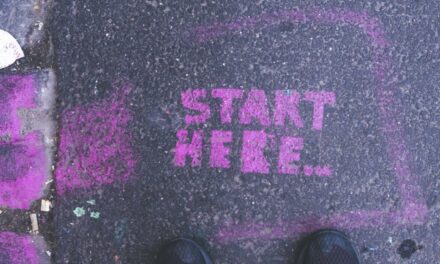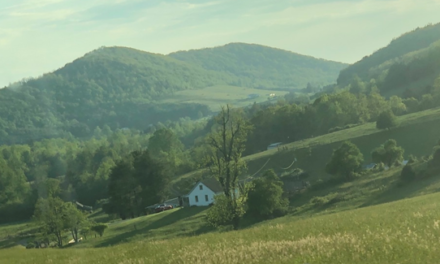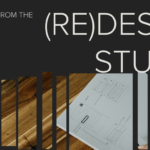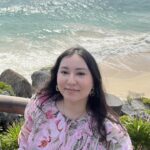
Assistant Editor Haley Crigger: I found myself in a strange place this summer—or, rather, I found myself in familiar places for strange reasons.
As part of my research for a short-story collection about Evangelical Kentucky, I drove some seven hundred miles around the state, following a combined version of the tourism department’s “Spiritual Itineraries.” My intention was to trace the journey of Christianity across the state and across time, absorbing, as best I could, the nuances of a complex religious culture through its monuments, and in conversation with the people who visited them. I read dozens of religious and academic texts. I visited the renowned meeting houses of the Second Great Awakening and the controversial Creation Museum. I did a silent retreat at a monastery, sleeping under a crucifix. I prayed. I had delightful, shocking, intimate, dull, horrifying conversations with strangers. I typed up over a hundred pages of observations, musings, and interview notes.
Yet as the summer of research came to a close, when I returned home and my partner, friends, and family members asked about my journey around Kentucky, I found I had nothing very intelligent to offer. “People are so complex,” I said. “All religions are connected.” My friends nodded politely.
All that I had learned, it seemed, was that I understood nothing. While the Ancients contend that this is the beginning of wisdom, it’s a stressful place for a writer to land after months of work, leading me to reflect on the ethics and repercussions of conducting research for fiction.
According to Min Jin Lee, who is famous for her journalistic approach to fiction writing, the research process often begins on shaky ground. “Doing this kind of work as I write and rewrite a work of fiction humbles me. . . . It teaches me to listen more. Reality corrects my preconceptions, and my eyes and my ears experience what my characters may ultimately feel.” The first step in inventing believable characters, it seems, is to realize how many of your ideas are bad: misinformed, underdeveloped, even problematic.
As writers, our preconceived ideas about other people can be dangerous. When stereotypes prevail, writers perpetuate narratives that were invented in order to marginalize and disenfranchise. Thorough research is crucial to avoiding these pitfalls, a topic Vanessa Hua addresses in her craft lecture “Writing Across Difference.” Although writers do not have to be a member of the community they’re writing about, she contends, they should be in community with them.
What is in flux between writer and subject, of course, is power, a historical imbalance that can only be corrected through mutually understood interdependence. “If you have come here to help me,” she says, quoting Lilla Watson, “you are wasting your time. But if you have come here because your liberation is bound up with mine, then let us work together.” It is only through thoroughly considered, balanced research that writers like Min Jin Lee are able to persevere through a decade of uncertainty working on a masterpiece like Pachinko (Grand Central Publishing, 2017). When asked how her research translates to the page, Lee says, “It’s the confidence I don’t have when I begin something. I have so much insecurity about the stuff that I don’t know, and by the time I finish my research I’m, like, Bring it.”
One of the reasons my summer of research was so humbling is that it was the first time I had left my liberal academic bubble in a while. For years I had been living in my head, in novels, in the New Yorker, in literary Twitter and niche lesbian memes. For many queer people, this enclave can be a kind of haven. I grew up in Kentucky, where I spent at least three days a week in the Pentecostal church my father planted and continues to pastor today. In Hua’s terms, I had been in community with the Evangelical community all my life, but in order to engage them honestly, I had to leave my little harbor, literally and mentally, and let them “guide the telling of their own story.” I don’t think I fully understood that returning “home” with institutional funding would require me to relinquish some power and control to a culture I had intentionally fled.
I have struggled to understand, let alone articulate, how rewarding it was to intentionally sit back and let people surprise me, for better and for worse. People like Olivia, a young woman who came all the way from Baltimore to spend a summer working at the Creation Museum. Her favorite writers are the Christian Apologetics, who take intellectual inquiry seriously, providing Christians with protection against doubt both in public and in the privacy of their hearts.
There was also Gene, who approached me from behind the bar, wordlessly placing two aperitif glasses between us and pouring a round of vermouth. After some casual chatting, I asked where I should go to join the celebrations for the Eighth of August, a Western Kentucky holiday similar to Juneteenth. “Anywhere but here,” she said, and what followed was the most ignorant, hateful, and bigoted rants I have ever heard. I sat in stunned, disappointed silence, unsure if the moment required me to be a researcher or a person.
And then there was Jessica, who owns a three-bedroom cottage and a few dozen acres, which she uses to nurse injured animals, provide a couple jobs, and house a neighbor or two when they fall on hard times. She’s a believer, but she stopped going to church in 2020 “because of all the cliques and fighting.” We went to the Eighth of August celebrations together, where her friend’s baby attached herself to my hip and we danced all night to Stevie Wonder.
A month out from my first funded research trip, I still feel a long way from the confidence Min Jin Lee describes finding through her notebooks and interviews. But the beauty of the writing community, of our annoying, very online, problematic liberal enclaves, is that we can look to others who have finished what we started. The task of renegotiating our power as writers is frightening, but it is a worthwhile effort, and one we should encourage each other to see through diligently, to take our mess of notes, background materials, and perplexing interview notes and say, Bring it.










